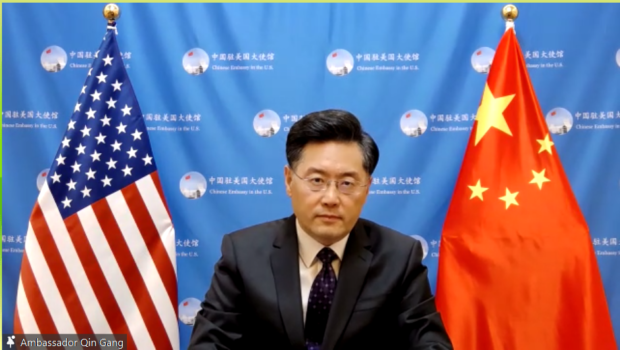
Chinese Ambassador to the US Qin Gang attends a dialogue with the Brookings Institution Board of Trustees in Washington on Thursday. Photo via China Daily/Asia News Network
WASHINGTON — China will continue to be a “reliable member” of the international system, committed to promoting peaceful development, while contributing its wisdom and solutions to global issues, Chinese ambassador to the US said as he called for “vision and actions” to prevent the two countries from confrontations.
“China does not want to disrupt or overturn the existing international system,” Ambassador Qin Gang said at a dialogue with the Brookings Institution Board of Trustees in Washington on Thursday. “China is not part of the problems in the world, but part of the solutions.”
In his speech, titled “Two Different Countries, One International System”, Qin noted that in recent years, the world has been increasingly looking to China to see what impact the country’s rapid growth has on the international order.
“We only want to work for a more peaceful and developed world, and at the same time create a favorable environment for our peaceful development, and contribute our wisdom and solutions to global issues,” the ambassador said.
He noted that throughout the past five decades of its United Nations membership, China was, is and will still be a reliable member of the international system.
“Despite the various difficulties we have, we always try our best to do our part and do it well,” he said.
Qin started his speech with a clarification of China’s view of the “rules-based international order” and “rules of the road”, terms that are frequently used but not made clear by the US side.
For example, the US says that its China policy is for defending the “rules-based international order” and ensuring the implementation of “rules of the road”, but it has not made itself clear on questions such as what the rules are, who made them and who are the “traffic police”.
“In our view, there is only one international system in the world, namely, the international system with the United Nations at its core. There is only one international order, which is the one underpinned by international law,” Qin said.
There is only one set of rules, namely, the basic norms governing international relations based on the purposes and principles of the UN Charter, and consequently, international affairs should be addressed through consultation, and genuine multilateralism must be practiced, he added.
As relations between the world’s top two economies have been going through “unprecedented difficulties” in recent years, some people believe that China and the US are two different “operating systems” incompatible with each other, the envoy said.
“On this, UN Secretary-General Antonio Guterres voiced out a common international concern: China and the US must avoid confrontation and the world cannot afford to be further divided,” Qin said. “We must work together to prevent his worry from coming true.”
To that end, the two sides must show vision and determination, and “take real actions to blaze a bright path” for the two countries and the world, he said.
The foremost thing to do is for both founding members of the UN to keep in mind the words in the UN Charter: “We, the people of the United Nations, are determined to save succeeding generations from the scourge of war, which twice in our lifetime has brought untold sorrow to mankind.”
“We must follow the trend of the times, bear in mind the common aspirations of the people, and work for an open, inclusive, clean and beautiful world with lasting peace, common security and shared prosperity,” Qin said.
Then the two countries must shoulder the “unshirkable responsibilities” for upholding the authority and position of the UN as the world’s two largest economies and permanent members of the UN Security Council.
The ambassador also said that there are principles to adhere to, including not to “reverse the wheels of history” by putting together small groups targeted at third parties, or to act against the trend of globalization by abusing and overstretching the concept of national security, setting up the so-called “Clean Network” and “democratic technology alliance”, and suppressing foreign companies without any justifiable grounds.
“Such actions have also increased global economic risks. The world should not be disrupted by ‘decoupling’ and the threat of ‘cutting off supplies’,” he added.
There are many areas where China and the US should and must cooperate, such as climate change, but different attitudes to the global issues may lead to “completely different results”, according to Qin.
“In 2014, we jointly helped African countries fight the Ebola epidemic. But after the outbreak of COVID-19, the US chose to politicize the disease, which created obstacles for us to get through this together,” he said.
Qin recalled that during their first virtual summit last Monday, Chinese President Xi Jinping told US President Joe Biden that the global initiatives China has proposed are all open to the US.
“We hope the reverse is also true,” Qin said. “The Belt and Road Initiative follows the principles of extensive consultation, joint contribution and shared benefits. We welcome the US to find its complementarity with Build Back Better World.”

